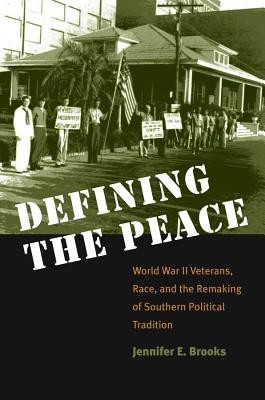
- We will send in 10–14 business days.
- Author: Jennifer E Brooks
- Publisher: University of North Carolina Press
- ISBN-10: 0807855782
- ISBN-13: 9780807855782
- Format: 16.4 x 23.5 x 1.7 cm, softcover
- Language: English
- SAVE -10% with code: EXTRA
Reviews
Description
In the aftermath of World War II, Georgia's veterans--black, white, liberal, reactionary, pro-union, and anti-union--all found that service in the war enhanced their sense of male, political, and racial identity, but often in contradictory ways. In Defining the Peace, Jennifer E. Brooks shows how veterans competed in a protracted and sometimes violent struggle to determine the complex character of Georgia's postwar future.
Brooks finds that veterans shaped the key events of the era, including the gubernatorial campaigns of both Eugene Talmadge and Herman Talmadge, the defeat of entrenched political machines in Augusta and Savannah, the terrorism perpetrated against black citizens, the CIO's drive to organize the textile South, and the controversies that dominated the 1947 Georgia General Assembly. Progressive black and white veterans forged new grassroots networks to mobilize voters against racial and economic conservatives who opposed their vision of a democratic South. Most white veterans, however, opted to support candidates who favored a conservative program of modernization that aimed to alter the state's economic landscape while sustaining its anti-union and racial traditions.
As Brooks demonstrates, World War II veterans played a pivotal role in shaping the war's political impact on the South, generating a politics of race, anti-unionism, and modernization that stood as the war's most lasting political legacy.
EXTRA 10 % discount with code: EXTRA
The promotion ends in 18d.14:44:41
The discount code is valid when purchasing from 10 €. Discounts do not stack.
- Author: Jennifer E Brooks
- Publisher: University of North Carolina Press
- ISBN-10: 0807855782
- ISBN-13: 9780807855782
- Format: 16.4 x 23.5 x 1.7 cm, softcover
- Language: English English
In the aftermath of World War II, Georgia's veterans--black, white, liberal, reactionary, pro-union, and anti-union--all found that service in the war enhanced their sense of male, political, and racial identity, but often in contradictory ways. In Defining the Peace, Jennifer E. Brooks shows how veterans competed in a protracted and sometimes violent struggle to determine the complex character of Georgia's postwar future.
Brooks finds that veterans shaped the key events of the era, including the gubernatorial campaigns of both Eugene Talmadge and Herman Talmadge, the defeat of entrenched political machines in Augusta and Savannah, the terrorism perpetrated against black citizens, the CIO's drive to organize the textile South, and the controversies that dominated the 1947 Georgia General Assembly. Progressive black and white veterans forged new grassroots networks to mobilize voters against racial and economic conservatives who opposed their vision of a democratic South. Most white veterans, however, opted to support candidates who favored a conservative program of modernization that aimed to alter the state's economic landscape while sustaining its anti-union and racial traditions.
As Brooks demonstrates, World War II veterans played a pivotal role in shaping the war's political impact on the South, generating a politics of race, anti-unionism, and modernization that stood as the war's most lasting political legacy.


Reviews